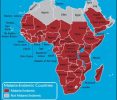The World Health Organization (WHO) urges African countries to enforce and ensure strong vaccine safety systems.
The working dinner held last week also intended to provide the vision for a future where vaccine safety concerns are addressed in a rigorous and transparent fashion and share perspectives on 21st century approaches that are relevant to African Countries. The event was organized in collaboration with the African Union Commission.
The Global Vaccine Safety Initiative (GVSI) is a global transformative approach for quality immunization programmes which was launched in 2012. To date, WHO considers that less than half of its Member States including most African countries have adequate capacity for vaccine safety. It is in this context that the WHO brief was organized and called on the highest leadership in Africa to ensure strong vaccine safety system.
Dr Margaret Agama-Anyetei from the African Union Commission in her welcoming remarks highlighted how vaccine has brought enormous benefits to the populations of Africa. Dr Margaret stated that “The eradication of smallpox, the gains made in the eradication of polio or the dramatic reductions in deaths of measles and epidemic meningitis are many successes that we have all witnessed.”
She added that “Today more vaccines against more diseases, including malaria, dengue or Ebola are becoming available and new funding mechanisms allow for those vaccines to be used more widely in African countries.”
On behalf of Dr. Akpaka A. Kalu, WHO Representative to Ethiopia Dr. Abebayehu Assefa Mengistu made an opening remark. Dr Abebayehu said that “The Global Vaccine Safety Initiative provides the mechanism to strengthen African countries regulatory authorities and immunization programs to ensure that everyone everywhere gets the safest vaccination possible.”
He added that “Credible data and our ability to explain how existing safety systems protect the quality of our vaccination programs is the best approach to counter the impact of doubt or malicious statements and rumors.”
The policy brief was presented by Dr. Patrick Zuber, World Health Organization-Head Quarters who highlighted major principles of vaccine safety initiative and why enhanced monitoring of the safety of immunization programs helps in increasing impact and benefits. He also discussed major recommendations of the policy which have been found key to the success of the vaccine safety system.
These recommendations include the need for dedicated human resources for vaccine safety for regulatory agencies and immunization programmes, national data system for monitoring vaccine safety, proactive communication about safety issues in support of all immunization policies and the commitment to international information exchange.
During his presentation, Dr Patrick also emphasized the need for robust vaccine safety surveillance system. In addition, he indicated that increasing immunization coverage and adding new vaccines to the programmes call for the need to demonstrative capacity to monitoring the safety of these vaccines and to have stronger safety systems.
Following the policy brief presentation, high level discussions were held, moderated by Ms. Margaret Ndomondo Sigonda from the New Partnership for Africa’s Development (NEPAD).
Finally, the session provided countries the opportunity to share their experience in addressing vaccine safety issues and indicated the perspectives on how the GVSI can add value to their immunization efforts.
